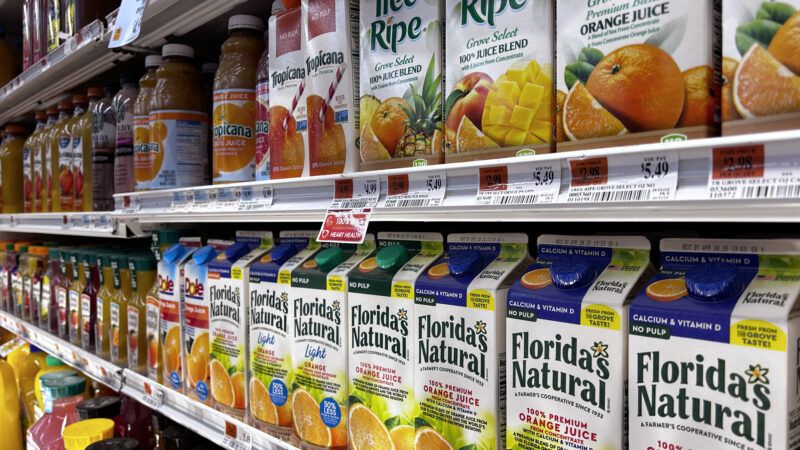A Trade War Will Reduce American Exports Too
It's obvious that tariffs will harm American companies that import goods. But the losses don't end there.

On the eve of the next expected escalation of President Donald Trump's trade war with the world, consider the plight of America's orange juice producers.
America exports a lot of orange juice to Canada—because we have an obvious comparative advantage when it comes to growing citrus fruit. In 2023, Canada bought $281 million worth of fruit juice from the United States.
In Trump's flawed way of looking at trade, that would mean America is somehow ripping Canada off, but this is actually a great deal for everyone involved. Canadians get orange juice that they can't produce on their own. America's orange growers and juicemakers get a larger market for sales. And lots of other people on both sides of the border make a buck by hauling, warehousing, stocking, and selling all that juice.
A trade war means all those people lose—the Canadians and the Americans. Orange juice is one of the products Canada has included in its package of retaliatory tariffs, and that's one of the reasons why orange juice prices have declined recently.
Much of the discussion about Trump's tariff proposals focuses on the impact they will have on imports. That's understandable since the most immediate and direct effect of tariffs is to raise prices for American businesses and consumers buying goods from abroad. But, as the orange juice example illustrates, the Trump administration's trade war will also harm American businesses that primarily export goods.
The impact of tariffs on exports is less direct than on imports, but no less serious. It happens in multiple ways. American industries—like orange farmers, to continue that metaphor—will face higher prices for inputs, such as farm equipment and fertilizer (much of which comes from Canada). Those same industries will have to deal with smaller export markets and less demand for their goods. Higher costs on the front end, lower prices on the back end.
"Counterintuitively, placing a tax on imports is economically like placing a tax on exports," explained Erica York and Nicolo Pastrone in a policy paper for the Tax Foundation last year. As they point out, economists estimated that Trump's 2018–19 tariffs resulted in about a quarter of U.S. exporters facing tariffs levied against their goods.
This time around, Trump is threatening a much broader trade war, which likely means much more retaliation against American exports in return.
One of the primary motivations for Trump's trade war is the president's concern about America's trade deficit—that is, the fact that America imports more than it exports. That discussion often omits a crucial detail: America exports more than ever before. In 2024, the U.S. exported $3.2 trillion worth of goods, a record high even as the trade deficit increased.
Trump imagines that tariffs will curtail imports and bring the trade deficit into balance. But that's unlikely because his trade war will diminish American exports—not just orange juice but many other products as well.
"More exports not only reduce deficits but also bring broader economic benefits through higher-paying jobs and greater innovation," wrote Shannon O'Neil, a senior vice president and director of studies at the Council on Foreign Relations, in Bloomberg last month. "Yet in a world of global supply chains, boosting exports means upping imports as well. Widespread tariff hikes will also hold back US-based exporters."
Trump and his allies have framed this trade war as a zero-sum game in which either America or its trading partners must win while the other loses. That's fundamentally wrong. Trade makes both sides better off.
Equally important: Limiting trade harms both the buyers and the sellers.


Show Comments (28)